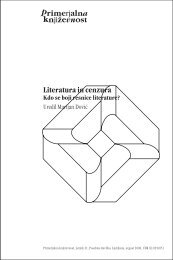Inštitut za slovensko izseljenstvo in migracije ZRC SAZU
Inštitut za slovensko izseljenstvo in migracije ZRC SAZU
Inštitut za slovensko izseljenstvo in migracije ZRC SAZU
You also want an ePaper? Increase the reach of your titles
YUMPU automatically turns print PDFs into web optimized ePapers that Google loves.
The Performative Power of Translocal Citizenship<br />
behaviour” that must be theoretically addressed and not rejected merely due to our theoretical purity<br />
or ontological pr<strong>in</strong>ciples. Therefore, a state is not someth<strong>in</strong>g that can be destroyed by means of a revolution,<br />
which is why it is necessary to build libert<strong>in</strong>e enclaves next to it, or to postulate a revolution as a<br />
“peaceful and gradual creation of counterculture” opposite to the idea of “a revolution as a violent mass<br />
rebellion”. It is impossible to atta<strong>in</strong> a free society merely by replac<strong>in</strong>g an old order with a new one s<strong>in</strong>ce<br />
it can only be atta<strong>in</strong>ed by spread<strong>in</strong>g the spheres of liberty to such an extent that they f<strong>in</strong>ally prevail over<br />
all social life. If the state is <strong>in</strong> all of us, then we can only abolish it by revis<strong>in</strong>g our behavior.<br />
One can overturn a table and smash a w<strong>in</strong>dowpane; but they are puffed-up word-spewers [Wortemacher] and<br />
gullible word-adorers [Wortanbeter], who hold the state for such a th<strong>in</strong>g – ak<strong>in</strong> to a fetish – that one can smash<br />
<strong>in</strong> order to destroy. The state is a relationship between human be<strong>in</strong>gs, a way by which people relate to each<br />
other; and one destroys it by enter<strong>in</strong>g <strong>in</strong>to other relationships, but behav<strong>in</strong>g differently to each other... [W]<br />
e must recognize the truth: we are the state – and are it as long as we are not otherwise, as long as we have<br />
not created the <strong>in</strong>stitutions that constitute a genu<strong>in</strong>e community and society of human be<strong>in</strong>gs (Landauer <strong>in</strong><br />
Graham 2005: 165).<br />
With<strong>in</strong> the AGM, the prefiguration of alternatives is also accepted through Hakim Bey’s popular conceptuali<strong>za</strong>tion<br />
of the spontaneous and subversive tactics of Temporary Autonomous Zones (TAZ) “which<br />
liberates a part (of land, of time, of imag<strong>in</strong>ation) and then dissolves itself to re-form elsewhere/elsewhen,<br />
before the State can crush it” (Bey 2003: 99). Accord<strong>in</strong>g to Jeffs’ (1997: 368–369) elaboration of<br />
Bey’s theory of TAZ, the political change should be “deterritorialized, decentralized, and del<strong>in</strong>earized on<br />
all political, economic, social, libid<strong>in</strong>al, and, last but not least, narrative levels, and small and nomadic<br />
forms of resistance <strong>in</strong>troduced, also because there is not a s<strong>in</strong>gle place <strong>in</strong> the world, which has not been<br />
del<strong>in</strong>eated by the nation state. ... [TAZ] is <strong>in</strong>visible to the state and flexible enough to vanish, when determ<strong>in</strong>ed,<br />
def<strong>in</strong>ed, and fixated.”<br />
Such emancipation does not have to postpone its mission for fulfillment of the necessary precondition<br />
– the maturity of objective historic circumstances, or the formation of some coherent subject or<br />
class – s<strong>in</strong>ce it builds on the supposition that every <strong>in</strong>dividual is capable of co-creat<strong>in</strong>g the world with<br />
their, even if very small, gestures (cf. Jeffs 1998: 22-23). Go<strong>in</strong>g back to Landauer, the necessary change<br />
“concerns every aspect of a human life, not only the state, class structure, <strong>in</strong>dustry and trade, art, education.<br />
... The path to a new, better social order runs along a dark and fatal road of our <strong>in</strong>st<strong>in</strong>cts and terra<br />
abscondita of our souls. The world can only be formed from the <strong>in</strong>side out” (Landauer <strong>in</strong> Marshall 1993:<br />
411–412).<br />
The concept of translocal citizenship represents a significant departure from classical theories<br />
of citizenship because it builds on <strong>in</strong>clusion and participation rather than on identity and, <strong>in</strong>stead of<br />
equality, it accentuates differences, or “equal differences”. Yet translocal citizenship should also not be<br />
understood as another postmodern conception of political membership characterized by relativism<br />
and particularism that, accord<strong>in</strong>g to Rizman (2008: 37), only detects diversity, difference, fragmentation,<br />
conflict and opposition, but not also commonality, equality, <strong>in</strong>tegration, consensus and <strong>in</strong>tegration.<br />
Referr<strong>in</strong>g to Darren O’Byrne (2003: 227), it “embraces plurality without be<strong>in</strong>g relativistic, universality<br />
without be<strong>in</strong>g determ<strong>in</strong>istic, and identity without be<strong>in</strong>g unduly subjectivistic.” Translocal citizenship<br />
thus represents a critique of the universalistic assumptions with<strong>in</strong> the liberal tradition, or their upgrade<br />
with differentiated universalism that draws close to Habermas’ idea of “constitutional patriotism”. Consider<strong>in</strong>g<br />
that translocal citizenship offers a different understand<strong>in</strong>g of political community and stresses<br />
its constant re<strong>in</strong>vention, we should <strong>in</strong>stead conclude that translocal citizenship represents a form of<br />
“unconstitutional patriotism” that <strong>in</strong> its replacement of ethnos with demos follows a significantly more<br />
radical def<strong>in</strong>ition of democracy than Habermas’. It does not equate democracy with a particular constitutional<br />
system only, nor with a particular constellation of centers of power with<strong>in</strong> a society, but <strong>in</strong>stead<br />
understands democracy <strong>in</strong> Westian terms – as a verb, and never as a noun (cf. West 2005: 68).<br />
15

















